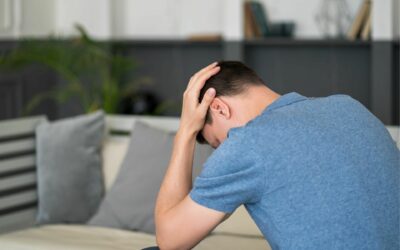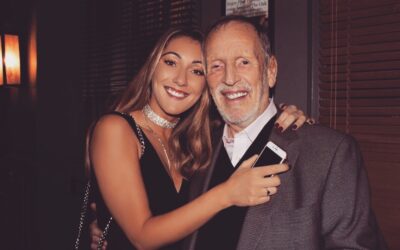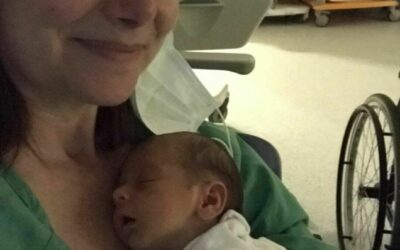This is my story about recovering from Guillain-Barre syndrome (GBS) after contracting the very rare illness for the second time at the age of 87.
I decided to share my story (with some help from my family) to give hope and inspiration to others with GBS that they too can recover as I have done on both occasions.
My first diagnosis was in 1993, aged 59. On that occasion, doctors diagnosed it very quickly and none of my family had ever heard of GBS. I was transferred to the Neurology Unit at James Cook Hospital, Middlesbrough where I spent about eight weeks in intensive care. I was almost totally paralysed apart from being able to open my eyes and move my head very slightly and required a ventilator for several weeks.
Thanks to the wonderful doctors and staff at James Cook, I gradually regained movement of my arms and legs and body strength and after a rigorous rehabilitation programme, I was able to return to work in the motor trade about six months after falling ill. It took about a further three months to make a full recovery. It was the first time I’d been off work since leaving school.
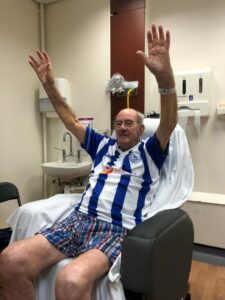
John proudly raises his arms just three weeks after being paralysed.
Fast forward twenty-eight years to Saturday 9 October 2021, I got out of bed looking forward to Hartlepool United’s home match against Northampton Town. I felt a bit dizzy/unstable when I stood up which was not normal and after struggling down the stairs, I started to get a tingling feeling in my fingers. I was also quite breathless.
My wife realised that something was wrong and contacted my two sons and daughter. That morning my balance and ability to walk quickly deteriorated but I was refused an ambulance after calling 999 as they said I didn’t meet the criteria.
My family subsequently took me to the local Urgent Care centre, and they suggested I went to the Emergency Assessment Centre at North Tees Hospital, Stockton-on-Tees. Family members immediately thought it could be GBS as the symptoms were very similar to the previous time. They highlighted this to medics, but surprisingly some were unaware of GBS.
Diagnosis on this occasion was not as quick and I deteriorated quite rapidly over the next couple of days and my oxygen levels were dropping. Three days after being admitted, I was eventually transferred to the Neurology Ward at James Cook. At this point I had lost all of the movement in my arms and legs, I therefore couldn’t feed myself and was struggling to speak.
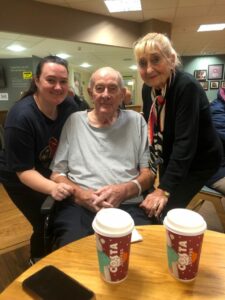
Visiting time – John enjoys a coffee in the hospital café with wife Margaret and granddaughter Holly.
My family were relieved that I was back at James Cook Hospital as they helped me make a full recovery almost three decades earlier with their specialist treatment and care which my family and I will always be eternally grateful.
The first question my family asked the doctors on the Neurology Ward was whether I could make a full recovery from GBS at the age of 87 and the response was an unequivocal ‘Yes’. This gave reassurance to my family which was clearly a worrying time for them.
As with most GBS patients, I received a five-day treatment programme of intravenous immunoglobulin treatment and my condition soon started to gradually improve. Within a couple of weeks, the movement in my arms and legs was much improved and I was able to feed myself again. I couldn’t walk at this stage, but I was able to be hoisted into a chair.
I get the impression that GBS diagnosis is not ‘black and white’ and there are several variants of it which probably makes diagnosis harder. During my early days in hospital, my family asked the doctors a few times whether I definitely had GBS – they wouldn’t commit but said I was being treated for GBS. One of the procedures to try and determine GBS is a lumbar puncture but mine took a couple of attempts – presumably because of my aging spine.
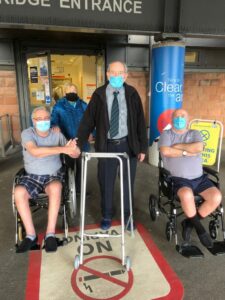
John walks out of hospital while fellow patients look on.
My mobility and strength continued to improve and after about four weeks I was transferred to the Rehabilitation Ward where I spent each weekday in the gym undertaking a range of strength and fitness exercises. Patients would often undertake tasks in teams such as hoopla and bowling which created a bit of fun and friendly competition. I would also regularly go in the hydrotherapy pool to aid my recovery.
Due to Covid, visiting was intermittent, and it was halted at short notice on occasions. However, staff on the ward always made sure that I could speak to my family over the phone which helped me enormously and kept my spirits up. Doctors and staff at James Cook Hospital were very quick to inform my family of any developing issues and my family always found it easy to speak to staff to get regular updates which is so important.
The numerous tests and scans undertaken whilst in hospital also revealed a couple of less serious health issues and as a result, I now receive daily medication for them. I also lost quite a bit of weight in hospital, but medics put this down to the strict diet and muscle reduction due to me being inactive for several weeks.
Christmas and New Year passed, and the rehabilitation programme continued, and a discharge target date was set which was a significant boost. Whilst in hospital, I also had a catheter fitted for several weeks. After a few attempts this was successfully removed before I was discharged which was another plus.
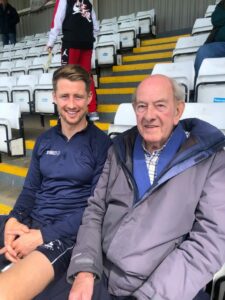
John is welcomed back to Hartlepool United by Neill Byrne seven months after falling ill.
As the weeks in the Rehabilitation Ward went on, the intensity of the physiotherapy increased. Physios remarked to my family that despite my age, I was the most committed and determined patient on the Ward and this contributed to me being able to be discharged four and a half months after I was admitted.
It was with great relief and joy that fellow patients and staff watched me walk out of the hospital to go back home to Hartlepool to my wonderful family. Whilst in hospital some adaptations were carried out at home. The bath was replaced with a shower which is much easier for me, and Hartlepool Council have installed a stairlift and a few other adaptions to help keep me and my wife safe. Regardless of GBS, we were probably at the stage in our lives when we needed those adaptations anyway.
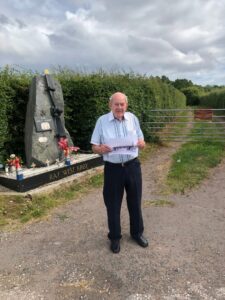
John returns to West Kirby, Wirral for the first time in 70 years to visit the site where he did his National Service training.
The one advantage of getting GBS for a second time is that I knew what I was dealing with and understood the challenges that lay ahead.
When I got home the physio continued with home exercises and I had a few weeks of community physio. Over the weeks and months my strength and mobility continued to slowly improve, and it wasn’t long before I started to resume some kind of normality.
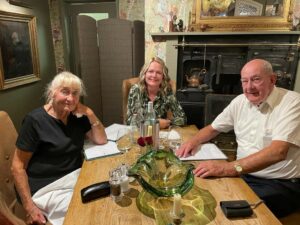
John enjoying a trip out with his wife Margaret and daughter Fiona.
I had a minor setback a few weeks after getting home when I contracted Covid but thankfully I recovered after a couple of weeks.
Seven months after falling ill, I was back at Hartlepool United for the last home game of the 2021/22 season against Colchester United when I was welcomed by one of the players, Neill Byrne which was lovely. A further three months down the line I was back playing a few holes of golf.
The main thing I struggle with ten months on from the diagnosis is that I can’t climb stairs like I used to but given my age, I can’t complain.
Finally, I want to thank my wonderful family who have been by my side every step of the way during my GBS journey. Their unwavering love and support and words of encouragement have been immense, and I am very fortunate to have them.
I would also like to thank Hartlepool-born Jeff Stelling, local radio presenter Paul ‘Goffy’ Gough and everyone else for their messages of support, along with fellow James Cook patient John Hill who was in the next bed and helped me get through this.
John Rae, Hartlepool
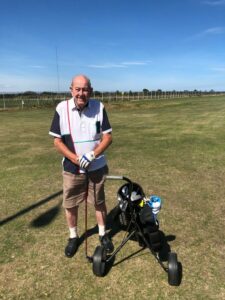
John returned to the golf course ten months after contracting GBS.

